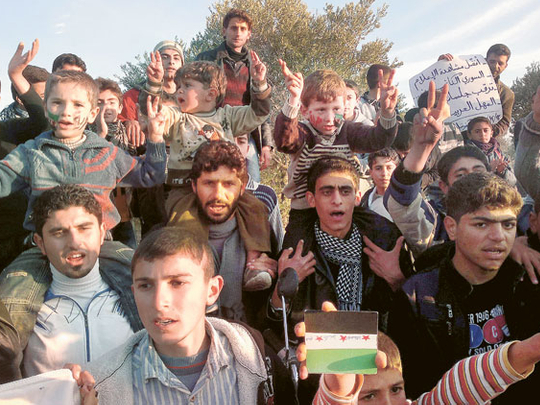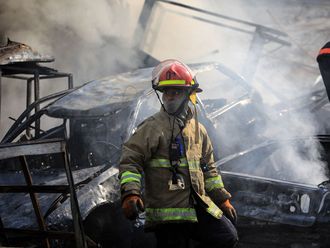
Amman: A Syrian Alawite centrist political figure said on Tuesday that four of his relatives were shot or kidnapped in sectarian violence threatening to undermine a nine-month pro-democracy uprising.
In a rare named testimony about sectarian killings that have racked the central city of Homs in the last few weeks, Mohammad Saleh told Reuters the four were targeted because they were Alawites, the same sect as President Bashar Al Assad.
"The violence by the regime has provoked counter violence. But a crime is a crime and it has to be condemned," said Saleh, a former political prisoner, by phone from Homs, a city of one million, 140km north of Damascus.
"I went to jail for a civilised Syria, not to replicate the values of the regime," said Saleh, who spent 12 years in jail for his opposition to Al Assad's father, the late president Hafez Al Assad, from whom Bashar inherited power in 2000.
Saleh said armed Sunni men killed Eisa Aboud, a 60-year-old relative of his while he was loading a van with his belongings to escape with relatives from the Madina Al Shababiya district of the city.
A youth helping them was hit in the stomach and is in hospital. A third relative present was abducted.
Thousands flee
"They are related to me through my wife. The driver of the truck was also killed. My nephew, Shadi Tammour, was separately kidnapped in Homs today," said Saleh. "I was among a group [of notables] from different sects who went to collect the bodies but the armed men did not let us take them. The bodies were picked up only after armoured security vehicles went into the area," he added. Fearing sectarian killings, thousands of Sunni families have escaped to other cities or to Jordan and Lebanon, according to residents, while thousands of Alawites have fled to ancestral mountain homes in villages to the west.
In the last few weeks reports have increased of kidnappings of groups of Sunnis and Alawites in the city, including women, although Alawite and Sunni figures have been meeting to stop the abductions.
Saleh, 52, helped draft a declaration last month by Burhan Ghalioun, president of the main opposition Syrian National Council, which called for calming of sectarian tensions between Alawites and Sunnis in Homs, but he said the whole opposition should take a firm stance against sectarian killings.
"Those who do not condemn the crimes may just as well be partners in the crimes," he said.
The declaration said kidnappings, assassinations and score-settling "pose a dangerous threat to the gains of the revolution and offer a big service to the regime."
Armed resistance emerged in Homs, along with street protests, in the last two months, after Al Assad deployed troops and tanks in the city in April to crush large demonstrations against his rule.
Expanded control
The mostly Sunni city has large Alawite neighbourhoods, whose residents were encouraged to move to Homs by offers of jobs in the state sector and its security network.
An offshoot of Shiites, members of the Alawite sect rose to power in Syria five decades ago after controlling vital squadrons and intelligence divisions in the military. Allying with a Sunni merchant class in Damascus and Aleppo, the Alawite ruling elite have since expanded their control on the state, key sectors of the economy, the military and the security apparatus now cracking down on a popular protest movement demanding an end to 41 years of Al Assad family rule.
The United Nations says the crackdown has killed 5,000 people. The authorities, who blame "armed terrorist gangs" for the violence, say 1,100 army and police have been killed.












